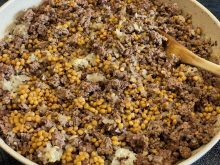Q: I would like to know what I have to do to get my nine-year-old son to listen to me when I have something important to say to him.
We want him to eat properly, to pick and choose nutritious foods, and to stay as far away from junk food as he can, but trying to get him to listen when we explain this to him is like reaching for that mythical pot of gold at the end of the rainbow. It doesn’t happen.
Read Also

Nutritious pork packed with vitamins, essential minerals
Recipes for pork
I know he is smart enough. I know that a nine-year-old should be able to fully understand the plusses and minuses of a healthy diet. And I know that he wants to be healthy.
He has posters all over his room of well-known athletes whom he admires. He wants to be like them and that means he should eat healthy.
But when we are not around and he can slip over to the junk store and pick up that garbage that so carefully maligns our bodies, he is gone like a flash.
Health is out the window and he is off to the land of the over-stuffed couch potato. What can we do to get him to listen?
A: I am not sure that I can think of anything more boring for a nine-year-old boy than one of those monotonous lectures that either his mother or his father delivers in the name of health.
That is almost as bad as sitting through his older sister’s piano recital. Maybe it is even worse.
The point is that if he is bored with your somewhat regular sermons on nutritious eating, he is not going to hear whatever it is that you have to say to him.
So far, you have just wasted his time and your time and it sounds like both of you are somewhat resentful of the process.
If you are really interested in helping your son learn a little more about healthy diets, why don’t you tell him a story? Make it up, make up something with high adventure and daring escapes, where the heroes are saved only by the magical powers of a tossed salad and where if it wasn’t for the ultra-cleanliness of flossed teeth even the most secret of hiding places would be uncovered.
If you let your imagination go crazy, you can probably come up with a number of little tales delivering the message you want your son to understand.
You might even include him in the process of making up the story.
Just remember that he is nine years old, not three, and that your story has to reflect the interests a preadolescent person might cherish.
Story-telling is an art. It serves as a vehicle for education in just about every culture and in fact has been researched to explore why story-telling is such an effective learning tool. Without going into too many details it would appear that stories activate to some extent the parts of the brain that you use when you are shuffling through real life experiences. Learning is the result of the neurological shuffle activated by the story.
The formula for stories is simple. Start the story by identifying the characters, including their strengths and weaknesses, and then carry your heroes into an adaptation to the healthy menu that you are promoting for your son. The story ends with a hero reaping the benefits from his or her newly adapted life style and living happily ever after.
Story-telling can be fun for all of you. Try it out and get back to me. I would love to hear what you come up with.
Jacklin Andrews is a family counsellor from Saskatchewan. Contact: jandrews@producer.com.

















